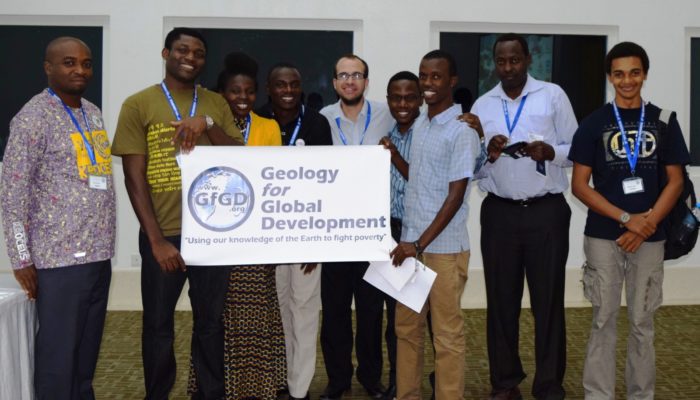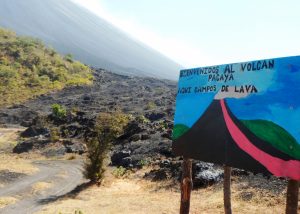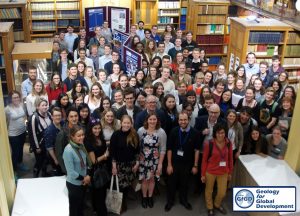
One of the most frequently asked questions put to me is ‘how does a geoscientist develop a career linked to international aid or sustainable development?’. Here are some thoughts, recently curated for the 2018 GfGD Annual Conference report, together with examples of how GfGD’s work helps to mobilise geoscientists to engage in sustainable development.
- Geoscience matters, is critical to progress towards sustainable development, but is not always recognised. While geoscientists are critical to delivering many aspects of the SDGs, this is not always clear and understood by others engaged in development work. Geoscientists have many relevant skills, and their knowledge of Earth systems means they are well placed to be at the centre of sustainable development decision making, and not on the fringes. In 2018, GfGD were invited to submit a report to inform the International Commission on Education for Sustainable Development Practice Report, highlighting how geoscientists could fill a gap in professionals trained to engage in sustainable development. This report will be published later this year, and we hope that it will note the important role that geoscientists could make to sustainability efforts, raising awareness among other communities of geoscientists skills and understanding .
-

Research into natural hazards can directly contribute to improved sustainable development decision-making. Photo Credit: Joel Gill
Two pathways, both equally important. While there isn’t a straightforward career path or graduate scheme into ‘geoscience for sustainability’, we note two general, broad pathways that help geoscientists to put sustainable development at the heart of their career. Both are important and can result in exciting opportunities to see positive change. (i) Work for a traditional geoscience employer (e.g., energy, mining, environmental services, academia, risk modelling, geological surveys), championing the values and ethics GfGD promote. You can devote your career to supporting sustainable development in all the traditional geoscience career routes (academia, industry, public sector), being ambassadors for our values and ethics. For example, championing positive and respectful partnerships that build local science, technology, and innovation capacity, promoting good practice, engaging with geoethics, and taking part in capacity building. Our 2017 papers on ‘Geology and the SDGs’ and ‘Geoscience Engagement in Global Development Frameworks’ (both open access) give examples of how engaging in traditional geoscience sectors can help deliver the SDGs. (ii) The second approach is to work for a non-traditional geoscience employer (e.g., NGOs, DFID, development think tanks), but be prepared to invest in additional skills and knowledge to serve effectively in these roles. There are few jobs in the development sector for those with a pure geoscience background but if you combine your environmental understanding with further expertise in logistics, policy, communications, social vulnerability etc (see #4 and #5 for tips as to how to do this), you could be a very attractive candidate. While geoscience will inform and strengthen you in such roles, it is unlikely that your tasks will involve the day-to-day application of geoscience.
- Be in it for the long-term. Getting to where you want to be may take time and involve a winding path. Think strategically about what postgraduate courses may suit your future career plans. For example, ask if there are options to do your dissertation overseas, take modules from other departments, or do placements with those working in development contexts (so you build your network of contacts, see #6). Partnerships with those in the Global South can also take time to develop and build trust. Prove that you treat partners with respect, fulfil your obligations to send them data and reports if they help you with your dissertation. Recognise that it can take time to develop and mature meaningful partnerships.
- Invest in new skills and ways of working. The skills required to make an effective and positive contribution to sustainable development are often missing from the traditional education and continued professional development of geologists. Examples include communicating across cultures and disciplines, diplomacy, community mobilisation, social science research methods (e.g., how to do a good semi-structured interview, and how can that data enrich your understanding of water resources or hazard impacts). Demonstrating an understanding of why these are important in development contexts, and some competence in these skills, may help to boost your employability in some roles. In 2016, GfGD published a book chapter on ‘Building Good Foundations – Skills for Effective Engagement in International Development’ that outlines these skills (email for a PDF copy). We believe these skills are vital in many geoscience roles, embedding them into our conferences and workshops (coordinating training at international events in Tanzania and South Africa).
- Read widely around development challenges. Development challenges (e.g., access to water, food security, energy poverty, climate change, disaster risk reduction, urbanisation) are rarely solved by one discipline. We get a good understanding of technical geoscience in our degrees but miss out on opportunities to interact with and learn from other disciplines (e.g., engineers, geographers, social scientists, health professionals). Careers outside of the traditional geoscience industries will require you to demonstrate a broader understanding of sustainable development than just the contribution of geoscience. This is a reason GfGD conferences are interdisciplinary with speakers from economics, social sciences, engineering, and public policy. There are texts relating to disaster risk reduction, water management, natural resources, climate change and urban development that will present new ideas from human geography or the social sciences. If another department includes modules on relevant development challenges, but from different perspectives, email and ask for a reading list and start to broaden your understanding.
-

The GfGD Annual Conference is a fantastic networking opportunity for geoscientists.
Network, Network, Network. Use any opportunity you can to network – including in person and through appropriate use of social media (e.g., Twitter). The latter can be a good way to find jobs and learning materials and introduce yourself to people in development. Keep online accounts professional and active. Look out for free events and talks at and outside of universities. Organisations such as ODI have free events where you can attend in person or remotely via a webinar. GfGD have previously facilitated networking meetings, arranged placements, and provided conference bursaries and hope to develop further opportunities in 2019.
Do you have any further tips or thoughts on mobilising and equipping geoscientists to contribute to sustainable development? We’d love to hear them, so please do use the comments below!
